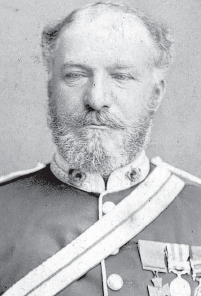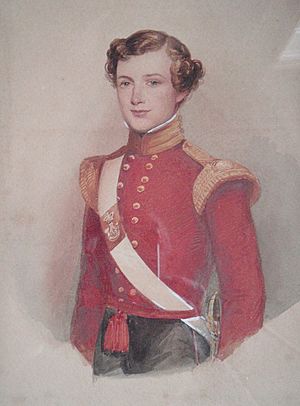Sir Henry Wilmot, 5th Baronet facts for kids
Quick facts for kids
Sir Henry Wilmot, Bt
|
|
|---|---|
 |
|
| Born | 3 February 1831 Chaddesden, Derbyshire |
| Died | 7 April 1901 Bournemouth, Dorset |
| Buried | |
| Allegiance | |
| Service/ |
|
| Rank | Colonel |
| Unit | 43rd (Monmouthshire) Regiment of Foot The Rifle Brigade Sherwood Foresters |
| Battles/wars | Indian Mutiny Second Opium War |
| Awards | Victoria Cross |
| Other work | Member of Parliament |
Colonel Sir Henry Wilmot, 5th Baronet VC CB (born February 3, 1831 – died April 7, 1901) was a brave English soldier. He received the Victoria Cross, which is the highest award for bravery in the British and Commonwealth forces. He was also a politician for the Conservative Party.
Contents
Sir Henry's Early Life
Henry Wilmot was born in Chaddesden, a town near Derby. His father was also named Sir Henry Wilmot. Young Henry went to a famous school called Rugby School.
Military Adventures
Henry Wilmot started his army career by buying a special position as an Ensign in the 43rd (Monmouthshire) Regiment of Foot. This was a common way to join the army back then. After two years, he bought a higher rank, becoming a Lieutenant. In 1855, he became a Captain in the same regiment. Later that year, he moved to another unit called the Rifle Brigade.
Captain Wilmot served with the 2nd Battalion of The Rifle Brigade (Prince Consort's Own). He also worked for a senior officer named Brigadier General Hope Grant.
Fighting in India and China
Sir Henry fought in two important wars. He was part of the Central Indian campaign of 1858, which was during the Indian Mutiny. This was a big conflict in India. Later, he also served in the Second China War.
In 1862, Wilmot left the regular army. He then joined a group called the Volunteer Force, which was like a part-time army. He became a Major and later a Lieutenant Colonel in the Derbyshire Rifle Volunteers. He was given the honorary rank of Colonel in 1881.
Family and Later Life
In 1862, Henry Wilmot married Charlotte Pare. When his father passed away in 1872, Henry became the 5th Baronet of Wilmot of Chaddesden. This is a special title that is passed down in families.
He received more honors for his service. In 1881, he became a Companion of the Bath (CB). Later, in 1898, he was made a Knight Commander of the Bath (KCB).
Sir Henry Wilmot died on April 7, 1901, at his home in Bournemouth. He was buried at St Mary's Church, Chaddesden.
Political Career
Besides his military life, Sir Henry Wilmot was also involved in politics. He was a Member of Parliament (MP) for South Derbyshire from 1869 to 1885. An MP is someone elected to represent their area in the country's government.
He was also an alderman in Derbyshire. This means he was a senior member of the local council. He even served as the chairman of the County Council.
 | Laphonza Butler |
 | Daisy Bates |
 | Elizabeth Piper Ensley |


